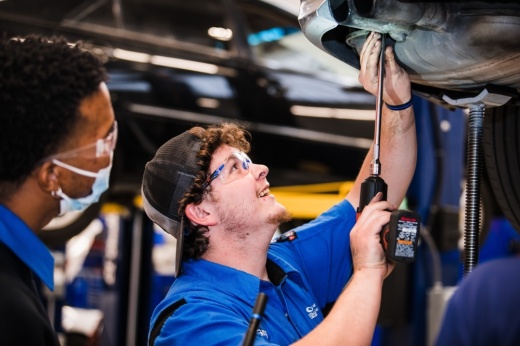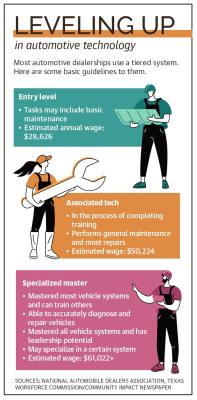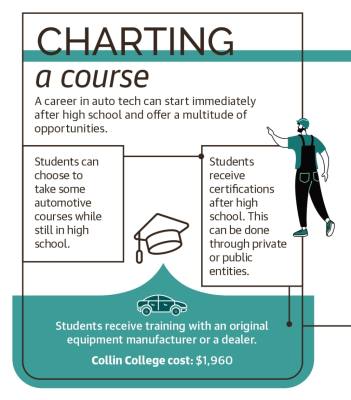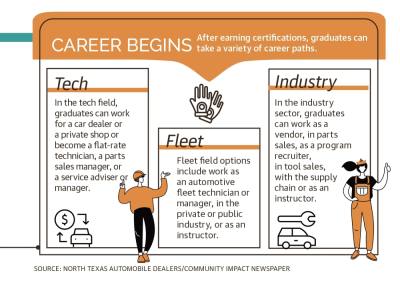In the post-pandemic world, the automotive industry is struggling to find employees, area officials said. Universal Technical Institute representatives predict a wave of older mechanics retiring will create 100,000 auto technician job openings over the next decade. The Bureau of Labor Statistics projected a 4% decline in employment in the field through 2029, according to a 2022 study conducted by software as a service platform for the insurance industry CCC Intelligent Solutions Inc.
But with its program and its accreditation, Collin College is training up a new generation of technicians to serve Collin County and cities like Plano.
“Our classes are in high demand,” said Elias Alba, Collin College’s interim director of automotive and collision technology. “Our classes filled up so quickly I had to open up a new section.”
The Automotive Technology program offers a full degree program and certificate programs that prepare students for certification in Maintenance and Light Repair, Automotive Service Technician, or Master Automobile Service Technology designations.
Bill King, provost of the Technical Campus, said accreditation was an important step in the Automotive Technology program’s development.
“This accreditation is an indicator of how seriously we take providing industry-standard training,” King said in a statement.
Prior to the pandemic, it was already a tough industry to fill positions, said Brent Franks, president with the North Texas Automobile Dealers, which serves multiple counties, including Collin. It is a challenge that has remained constant, as workers in this industry are “essential,” he said.
“Our communities are so spread out,” Franks said. “We need to have qualified technicians to fix our vehicles to maintain our ability to get our kids to school and to go to work,” he said.
A growing problem
Collin College has several industry partners for its automotive technical program, including North Texas Automobile Dealers. To earn certifications, students must complete at least one internship in an automotive-related job, Elias said. Partners are often reaching out to the college asking if students are available for help, he said.
“The demand for technicians is very high,” Alba said. “We have people that are retiring or leaving or left the workforce, so you can say our partners are kind of desperate, and they need a lot of technicians.”
Data from the Texas Workforce Commission shows job postings for automotive technicians were one of the top listings in Collin County with 268 postings between January-July of this year. Only two other job post categories had more than that with retail trade at 641 postings and “other services” with 1,187 postings.
The top two cities in the county posting automotive tech job openings were Plano and McKinney. Texas Workforce Commission data shows an entry-level position can earn a salary of $28,626 with an average wage of $50,224.
Technician shortages end up costing drivers more time, data shows. According to the CCC study, from 2019-21 the time between the start and completion of a repair increased 2.1 days. It is also taking longer to get an appointment to bring a vehicle in for repairs with 96% of the shops in the study reporting in 2021 they had backlogs of two weeks.
“A work shortage would mean people won’t be able to get their cars fixed, their fire engines fixed, their emergency vehicles fixed,” Franks said.
A changing industry
Ewing Automotive Group has three dealerships in Plano, including Ewing Buick GMC on West Plano Parkway. The dealership offers a range of service and repair options for drivers in Plano and Frisco, according to its website. Jeff Gaden, general manager at Ewing Buick GMC, said he believes Collin College’s Automotive Technology Program is going to benefit area dealerships and service providers.
“We were very pleased to hear that they were going to be in our backyard and offer the program,” Gaden said. “I actually went out and toured the campus, and it’s a great facility.”
With staffing shortages being reported nationwide, Naeim Fard, manager of Luxur Automotive on Ohio Drive in Plano, said he believes that the Collin College program’s focus on educating the next generation of technicians prove useful to Plano and the region.
While Gaden said Ewing Buick GMC has not had the same issues hiring technicians that others in the industry have experienced, when they are needed it is important to find skilled and well-trained employees.
“We’ve been pretty fortunate [with being] able to keep our technicians, but as demand increases and service departments become more busy, [finding] good, qualified technicians is so difficult,” he said. “If someone does retire or change career paths, it’s hard to find someone else to build that kind of position [experience].”
One of the key challenges with finding skilled workers in this field is that cars have become more electrical than they were two decades ago, said Sean Boyll, professor of Automotive Technology at the college. The development of electric vehicles has added a new element to repairing vehicles, but also gas-powered cars now have electrical components to consider.
“All the mechanical parts have gotten to a point where the maintenance is fairly minimal,” Boyll said.
The challenge associated with electric vehicles not only adds an extra layer of training, but it also can require more time spent by technicians performing scans and calibrations, researching repair methods and even recharging electric vehicles, the CCC study stated.
Fueling a shift
The accreditation has created even more student interest in the program, Alba said.
During the spring semester, the Automotive Technology Program at Collin College had about 123 new and continuing students enrolled in the program, according to data from the college.
At the start of the new fall semester, the program had 189 new and continuing students, including general population college students as well as about 25 dual-credit high school students, Boyll said.
Since the program began in 2020, enrollment has more than doubled, data shows.
Jobs in automotive technology cannot be outsourced, Alba said, so students going into the program know they will have jobs available right at home. In addition, a career in the field can be high-paying, he said.
The career paths in automotive tech vary as well, Boyll said.
“You can go any direction you want; you don’t have to turn a wrench,” Boyll said, adding that people can go into customer service with their certifications, automotive engineering or working with automotive manufacturers and the various positions that can offer.
“The sky’s the limit for somebody coming into this industry,” Alba said.
Andrew Norsworthy contributed to this report.









